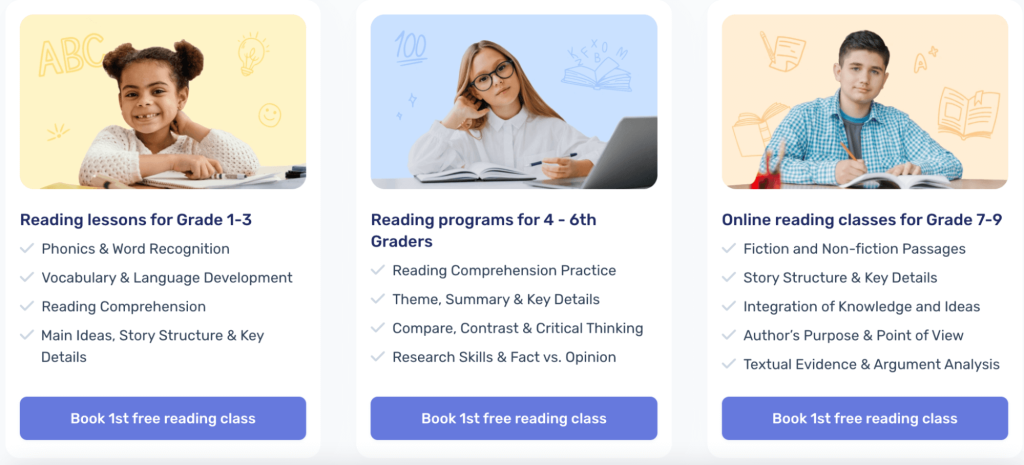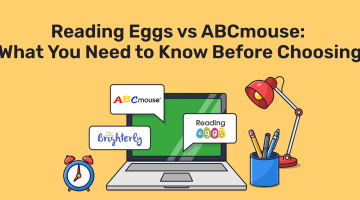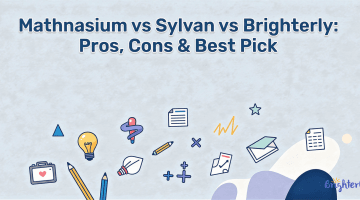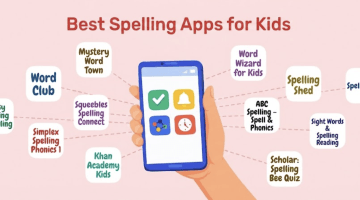How to Improve Reading Skills in Students: 10 Proven Methods (Parents’ Guide)
reviewed by Marvi M. Andres
Updated on November 4, 2025
If your child struggles with reading, you’re not alone – many parents face the same challenge. Strong reading skills are key to academic success and confidence at school.
In this article, we’ll explain how to improve reading skills in students using proven, fun, and practical strategies. You’ll discover the best ways to strengthen phonics, fluency, vocabulary, and comprehension – and see how Brighterly reading tutors can make this process easier and more engaging for your child.
Key points
- Tutoring is one of the most effective ways to increase reading skills in all five dimensions consistently.
- To develop phonemic awareness and practice phonics, add the decoding and repeated reading routines into your daily practice.
- For working on fluency, vocabulary, and comprehension, introduce problem-solving games and discussions, add cross-curricular and multisensory approaches, and get guided practices (by you, an app, or a private mentor).
How to improve reading skills in students
- Work with a professional reading tutor
- Practice decoding skills daily
- Play phonemic awareness games
- Apply repeated reading to develop fluency
- Find ways to enlarge their vocabulary
- Guide reading comprehension
- Try involving other senses in reading
- Introduce cross-curricular connections
- Apply technological assistants to reading
- Proactively support your kid as a parent
Note: Some strategies (like professional tutoring) can involve other strategies as their tactics. For example, Brighterly tutors can help your kid practice decoding, guide their repeated reading, and apply multisensory tools in one lesson.
Top 10 ways to improve reading skills
#1 Work with a professional reading tutor
Best for: kids of any grade (1–12) and reading level
As a method for improving reading skills, tutoring gives your child focused learning that covers their current knowledge gaps, improves their grades, and adjusts to their learning pace. Platforms like Brighterly offer such reading tutoring services.
How to improve students reading skills with reading tutors?
Brighterly tutors help students from 1st to 9th grade fix their current reading problems, get better grades, and recognize why reading is important. To improve reading skills, they use highly effective and interactive methods, adjusting them to your kid’s knowledge gaps and interests.
Brighterly reading tutoring platform is an excellent option for parents who are in search of professional private teachers for their students and value for money.
With Brighterly tutors, your kid can get a set of 1:1 personalized sessions that will make them more confident and fluent at reading, to the extent of purely enjoying it! It’s possible thanks to the friendly, engaging, easy-going, and highly effective approach used by Brighterly tutors.
The Brighterly reading program concentrates on fundamental literacy abilities like critical thinking, story analysis, and vocabulary growth. The composition of the course depends on your child’s needs.
Improving reading skills with Brighterly: How it works
- Let your child pass a free reading skills test to immediately see knowledge gaps that need to be worked on.
- Use one of the free thematic reading worksheets to practice problem areas or combine exercises from several worksheets.
- Hire a Brighterly tutor for an affordable price to get your kid a reading partner, an attentive teacher, and a mentor who will show them how to overcome their reading problems and enjoy reading on their own.
#2 Developing reading skills by daily decoding practice
Best for: kids who have just started training their reading skills

Decoding is an essential skill of linking letters with sounds. The consistent practice of strengthening decoding skills can significantly enhance your child’s reading abilities. With time, they will be able to connect sounds with words and words with meaning, which will help them read effortlessly.
How to develop reading skills in students via decoding practice
- Start with learning or covering the gaps between the letters and their sounds. This way, you can make sure that your kid has mastered the foundations before improving this basic skill.
- Make a habit of picking up a text and breaking random phrases from it into words, and then words into individual letters and sounds. Challenge your kid to decode them.
- Steadily increase the complexity of the words and sentences you choose, but make sure the practice remains comfortable for your child.
#3 Reading improvement with phonemic awareness games
Best for: kids who always want to have fun!
Combining games with phonemic awareness basics can significantly boost reading abilities. Try playing with rhymes, combining sounds, and replacing letters to create new words. The key here is to teach your kid phonemic awareness, but choose a game format to engage and entertain them while learning.
How to improve reading skills in primary students with games
- Use various tools to create letters and play with their forms: you can use plasticine, clay, dough, mosaics, or seeds.
- Experiment together with rhyming sounds and inventing random combinations with them.
- Play the Words of the Week game to get some words you can reread to reinforce phonemic awareness fundamentals.
#4 Repeated reading strategies and skills
Best for: kids who need more time to understand all the details before learning

Sometimes, kids need to reread the passage or reuse some letters one more time after a break to overcome their reading problems. If your child learns in this manner, make rereading your reading strategy — but make sure this method doesn’t overwhelm them. If you push it too hard, they can start associating reading with boredom.
How repeated reading contributes to improved reading skills
- Rereading is equal to controlled processing, or the practice when a new skill gets extra effort and time to be performed with greater precision in the future.
- In terms of improving reading skills, rereading contributes to increasing accuracy and speed of reading.
- Automatic reading is the first step in shifting from “learning to read” to “reading to learn” mode.
#5 Why when practicing reading skills, you should focus on vocabulary
Best for: curious kids who get inspired by learning something new
Unfamiliar words may be a stress factor for your kid. That’s why enlarging their vocabulary can be an effective strategy for your struggling reader. To make it effective, consider playing the Word of the Day game: find an interesting word, learn its meaning, discuss its application in your lives, and use it as your password in conversation for something special.
How the simple view of reading is the product of decoding and vocabulary skills?
- Knowing many words facilitates the ability to quickly catch the meaning of the texts.
- Rich vocabulary is the basis for fluent speech and critical thinking.
- According to the PMC research, vocabulary is the background for reading skills development.
#6 Guided reading comprehension as one of the critical reading skills
Best for: kids who know how to read but struggle to get the point of it
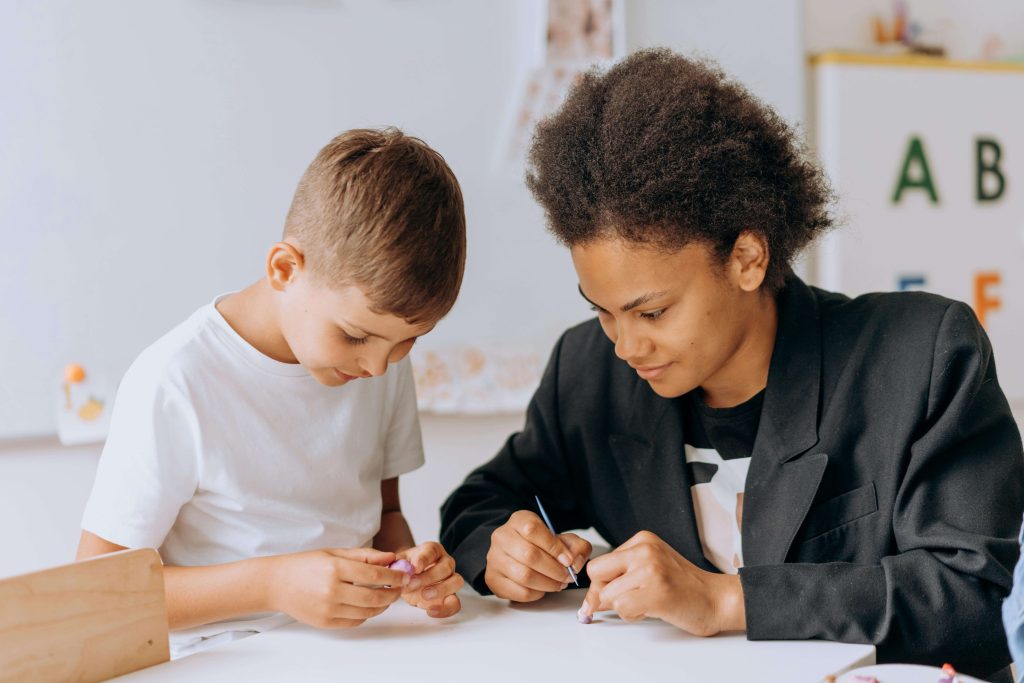
Shifting from deciphering words to getting their meaning is not easy for most kids. But with a guided reading comprehension strategy, you commit to setting apart enough time to understand the sense and nuances of the text.
What to do to improve reading comprehension skills with guided reading
- Discuss all the ideas described in the text and try to find together the main one that unites them all. Think about the author’s purpose in raising these ideas.
- Work on the outline of the text, summarizing and structuring information into logical blocks. Discuss the title, illustrations, and captions and their role in the text.
- Ask them questions about the text and discuss together your feelings and conclusions from what you’ve read. This way, you’ll develop their critical thinking and show how to apply the new knowledge gained across several subjects.
#7 Multisensory ways to improve your reading skills
Best for: kids who can benefit from visual, auditory, kinesthetic, and tactile learning
Applying several senses in learning increases the depth of perception, and you can use this specifically as a reading strategy. Introduce movement, gestures, touching, music, and drawing into reading practice in your teaching methods to help your kid absorb new information more easily.
Examples of multisensory activities that foster foundational reading skills
- Writing letters on paper or sand
- Clapping and signing while pronouncing sounds
- Supplementary sounds and visual effects on the text in YouTube
- Drawing images of what was just read
#8 Cross-curricular connections as a way to improve reading skills for kids
Best for: active learners who are already passionate about subjects other than reading

It’s hard to hook a child into reading if their mind is constantly somewhere else. If you know what their current interests are, try to connect reading with them. There are so many ways you can do it, from writing the letters on their soccer ball to practicing dancing to tell the story of the text they just read.
List of reading skills and strategies to practice them cross-curricular
- Decoding skills: Read together signs, random words, and phrases.
- Vocabulary: Sticky notes around the house, drawing the letters and their meanings.
- Comprehension: Stories about other subjects, playing music and dancing as communicating the main text idea.
- Text structure: Using blocks, graphs, and sketches to build the text outline.
#9 How to find an app to improve reading skills
Best for: kids who prefer their phones to everything in the world
To find a reading app that will help kids read instead of distracting them, start by getting recommendations from teachers. After that, add your own research. You need a technology that focuses on a specific reading struggle and allows your kid to set success goals and earn some points for the right answers. This way, you’ll get the app that makes the practice interactive yet productive.
Does listening to audiobooks improve reading skills?
Yes, it does. When you combine written text with its audiobook version, you involve a multisensory approach in learning and influence the depth of perception. Also, audiobooks cover the gap between word recognition and pronunciation, which can boost your kid’s ability to understand complex syntax and enlarge their vocabulary.
#10 Kindergarten reading skills & proactive parental support
Best for: kids learning better in the presence of their parents
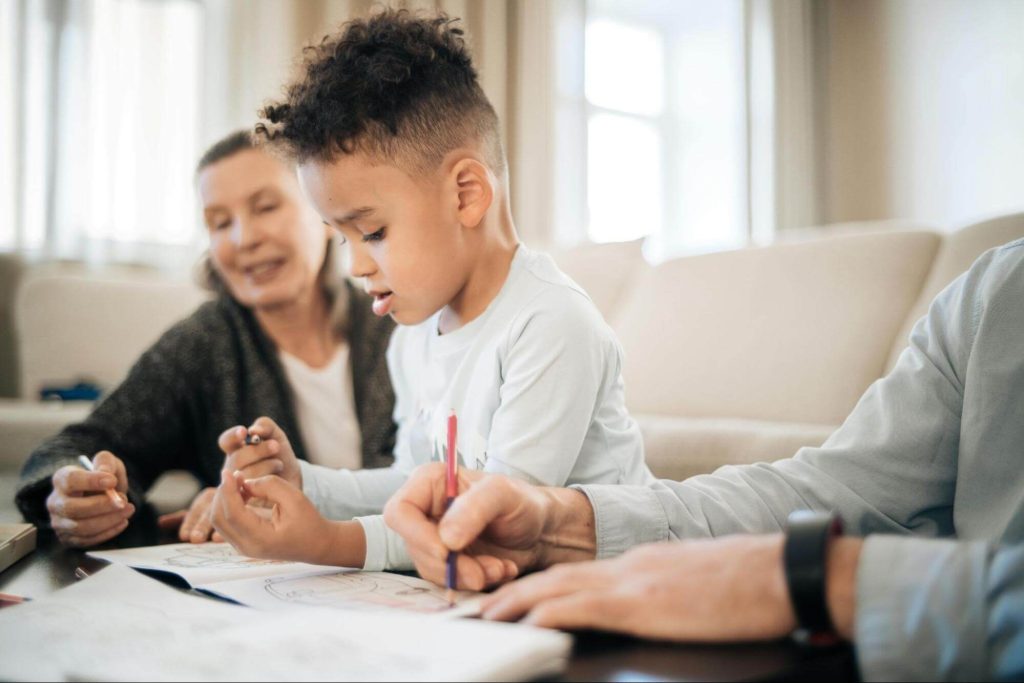
According to the PMC research, greater parental involvement contributes to improving social skills. Thus, if your kid asks for your help while struggling with reading, you can choose a proactive strategy that both supports them yet builds their independence.
What parents can do to strengthen their kids’ kindergarten reading skills
- Read in their presence and aloud to them to show how love for reading works.
- Discuss new words and ideas taken from the texts you’ve read every day with them.
- Print graphic materials, use organizers, and play letter games regularly with them.
- Choose together and buy them books of their interest.
- Hire a private tutor to get your kid a reading partner and a mentor for their current struggles and future studies at school.
Conclusion: Improve reading skills with these best practices!
Solving current reading problems and constantly improving reading skills are a matter of time, effort, and the right approach chosen. By picking one of the strategies from this list, you can contribute to developing and strengthening the reading skills of your child as a combination of phonemic awareness, phonics, fluency, vocabulary, and comprehension.
How to improve reading skills in students with these methods?
- Daily practice on decoding to strengthen the reading foundation
- Introducing games to facilitate phonemic awareness and develop reading skills
- Help your kid deal with phonics and increase reading fluency by repeated reading
- Create an environment where new vocabulary is constantly introduced and learned
- Read and discuss what is written together to boost their comprehension
- Apply multisensory, cross-curricular, or tech approaches to facilitate their learning
- Get your kid a reading mentor to proactively help them improve reading skills.
If you don’t have enough time to proactively support your kid in increasing reading skills but want to see the results, check how tutoring works – try Brighterly!
You can book 1st free reading class to understand if your kid feels comfortable with this format. It won’t cost you anything, but it’s worth a try!


